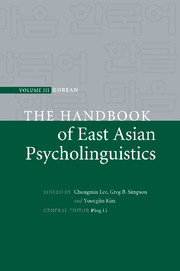Book contents
- Frontmatter
- Contents
- List of figures
- List of tables
- List of contributors
- Preface
- Introduction: Advances in Korean psycholinguistics
- Part I Language acquisition
- Part II Language processing
- 28 Visual processing of Hangul, the Korean script
- 29 English vowel spaces produced and perceived by Americans and Koreans
- 30 Morphological representation and processing of Sino-Korean words
- 31 The role of phonology in word recognition of Korean Hangul and Hanja
- 32 Lexical and sublexical processes in Korean word recognition
- 33 Prosody in sentence processing
- 34 Korean sentence processing
- 35 Sentence processing and memory representation in Korean
- 36 Understanding complex sentences: memory constraints and informational structure
- 37 ERP studies of Korean language processing: word-order effects
- 38 Inferences during discourse comprehension in Korean
- 39 Morpho-syntactic processing in Korean aphasics
- 40 Morpho-syntactic processing of Korean-speaking adults with Broca's aphasia
- 41 Comprehension deficits in Korean agrammatic aphasia
- 42 Developmental reading disorders in Korean
- 43 Individual differences in Korean language processing: context-dependent processing of skilled readers in word ambiguity resolution
- 44 A computational model of lexical and morphological processing in Korean
- References
- Name index
- Subject index
43 - Individual differences in Korean language processing: context-dependent processing of skilled readers in word ambiguity resolution
from Part II - Language processing
Published online by Cambridge University Press: 05 June 2012
- Frontmatter
- Contents
- List of figures
- List of tables
- List of contributors
- Preface
- Introduction: Advances in Korean psycholinguistics
- Part I Language acquisition
- Part II Language processing
- 28 Visual processing of Hangul, the Korean script
- 29 English vowel spaces produced and perceived by Americans and Koreans
- 30 Morphological representation and processing of Sino-Korean words
- 31 The role of phonology in word recognition of Korean Hangul and Hanja
- 32 Lexical and sublexical processes in Korean word recognition
- 33 Prosody in sentence processing
- 34 Korean sentence processing
- 35 Sentence processing and memory representation in Korean
- 36 Understanding complex sentences: memory constraints and informational structure
- 37 ERP studies of Korean language processing: word-order effects
- 38 Inferences during discourse comprehension in Korean
- 39 Morpho-syntactic processing in Korean aphasics
- 40 Morpho-syntactic processing of Korean-speaking adults with Broca's aphasia
- 41 Comprehension deficits in Korean agrammatic aphasia
- 42 Developmental reading disorders in Korean
- 43 Individual differences in Korean language processing: context-dependent processing of skilled readers in word ambiguity resolution
- 44 A computational model of lexical and morphological processing in Korean
- References
- Name index
- Subject index
Summary
Introduction
The goal of readers is to comprehend texts coherently. There are substantial individual differences in reading comprehension ability, which can be attributed to individual differences in the ability to integrate propositions coherently. Recently, studies focusing on individual differences in language comprehension have increased, and most use the concept of working memory to explain this phenomenon. Although only a few studies have examined individual differences in languages besides English (e.g. Osaka & Osaka, 1994), there are nevertheless a few studies exploring whether there are differences of individual differences across various languages.
Since Daneman and Carpenter (1980) developed the reading span task, several studies have revealed that readers with large working memory capacities have better comprehension abilities than those with small capacities. Working memory is composed of processing and storage modules (Baddeley, 1986) and the reading span task was designed to demand both components. For example, a participant reads aloud several sentences, memorizing the final word of each sentence. When instructed to recall the final words, high-span participants have a greater capacity than their low-span counterparts to memorize more words while reading sentences. Daneman and Carpenter's study has been often cited as representative of individual difference studies because of the value of the reading span task as a measurement tool for working memory capacity.
Many studies using the reading span task revealed that high-span participants differ from low-span participants in several domains, such as ambiguous-word processing (Miyake, Just & Carpenter, 1994), vocabulary learning (Daneman & Green, 1986), syntactic processing (King & Just, 1991), syntactic ambiguity resolution (MacDonald, Just & Carpenter, 1992), and pronoun resolution (Daneman and Carpenter, 1980).
- Type
- Chapter
- Information
- The Handbook of East Asian Psycholinguistics , pp. 528 - 537Publisher: Cambridge University PressPrint publication year: 2009



